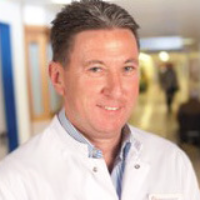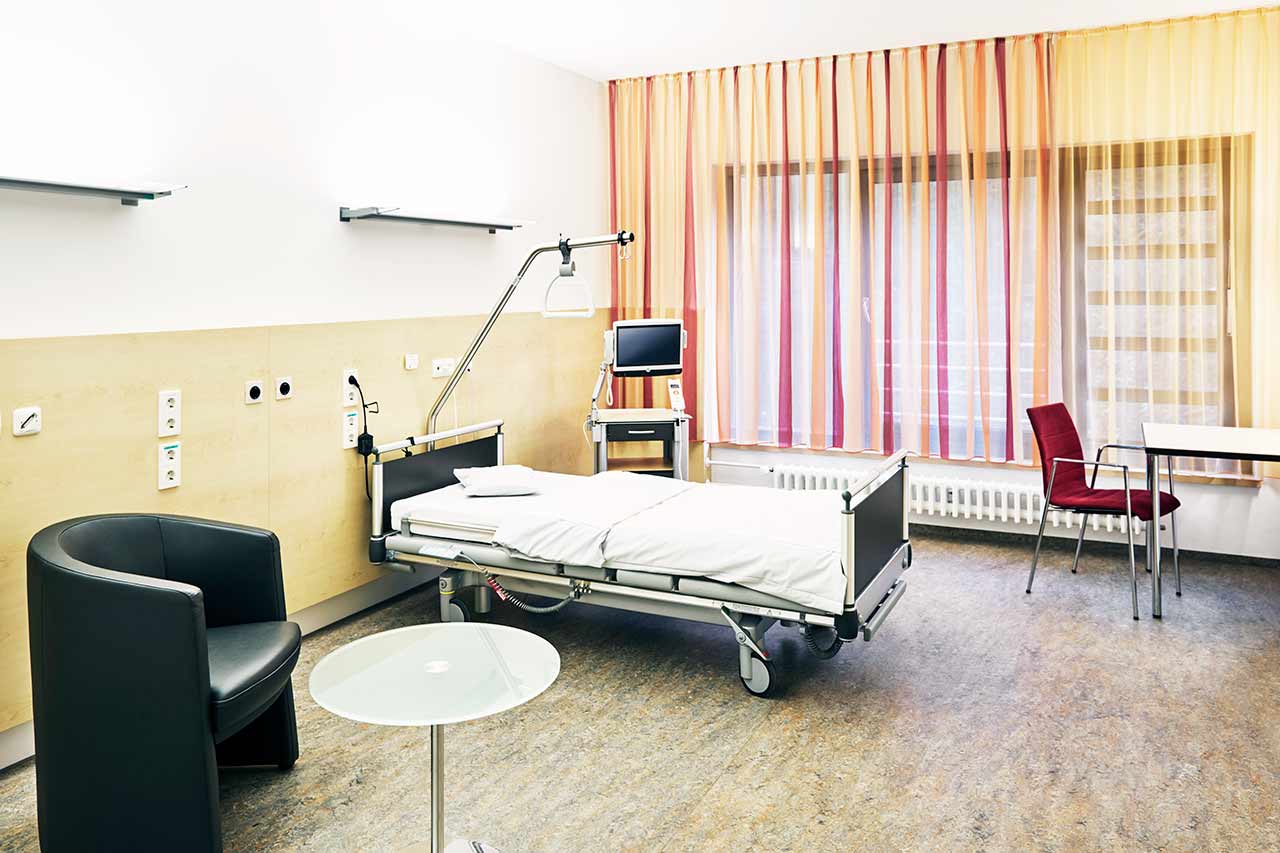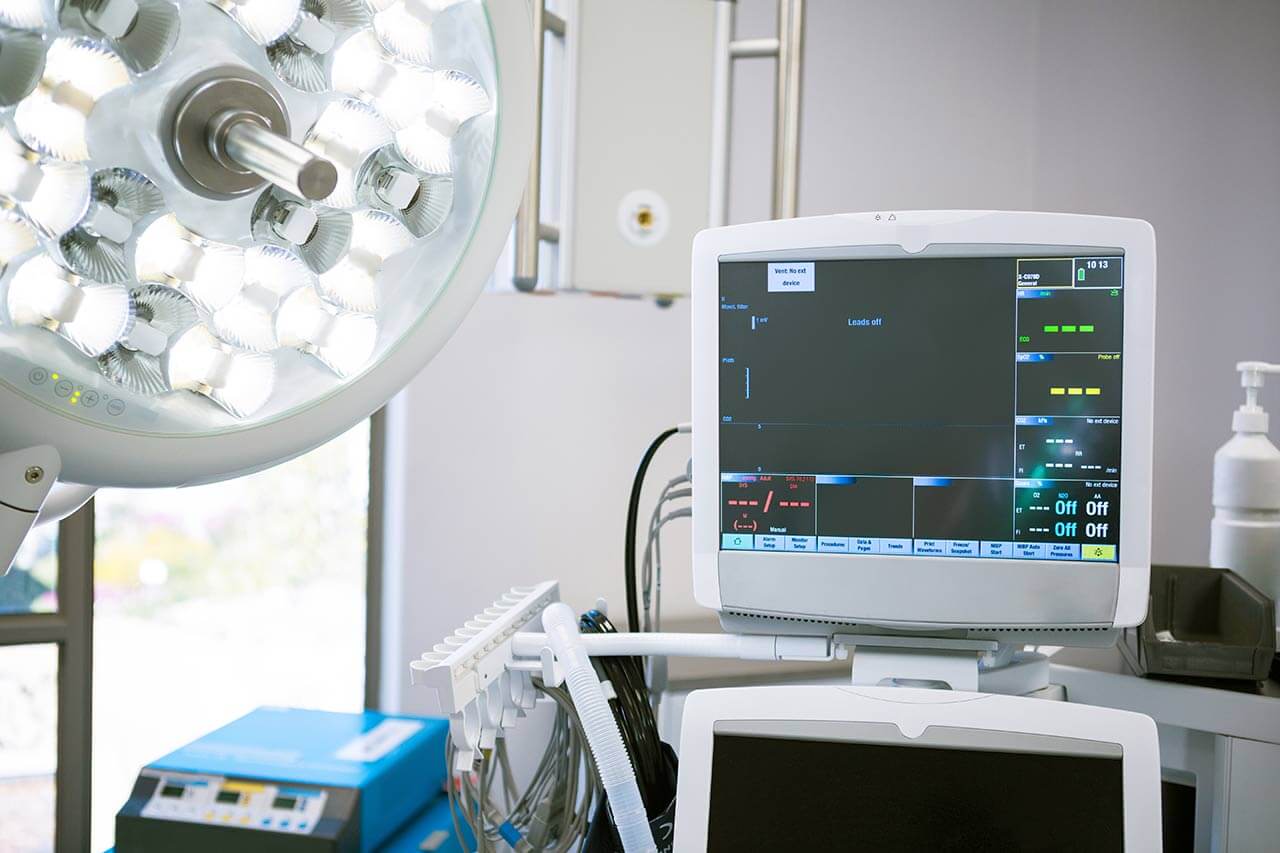
The program includes:
- Initial presentation in the clinic
- clinical history taking
- review of medical records
- physical examination
- laboratory tests:
- complete blood count
- biochemical analysis of blood
- inflammation indicators (CRP, ESR)
- TSH-basal, fT3, fT4
- indicators of blood coagulation
- CT planning of radiation therapy
- full course of conventional radiation therapy
- symptomatic treatment
- cost of essential medicines and materials
- nursing services
- control examinations
- consultations of related specialists
How program is carried out
During the first visit, the doctor will conduct a clinical examination and go through the results of previous laboratory tests and instrumental examinations. After that, you will undergo an additional examination, including complete blood count, laboratory assessment of liver and kidney function. Based on the received results, the physician will conduct radiotherapy planning with the help of CT or MRI, make the permanent tattoo marks on the skin and conduct CT simulation in order to assess the accuracy of the rays and the radiation dose. If necessary, related medical specialists will be involved in the elaboration of a treatment regimen (tumor board).
Radiation therapy is carried out as the day hospital procedure, without mandatory admission to the hospital. At each visit, the physician will assess your general condition and the marks on the skin. After that, you will be placed in a shielded radiation therapy room, on a special table.
Each radiation therapy session lasts less than half an hour (including preparation). All this time, doctors and nurses are monitoring your condition, you can communicate with them through a loudspeaker. The procedure is completely painless. Depending on the planned course of treatment, you will visit the hospital from 1 to 3-5 times a week.
After the completion of the radiation therapy course, you will undergo control examinations aimed at assessing your condition and efficacy of treatment. After that you will receive the medical report with detailed recommendations regarding further follow-up and treatment. In the future, you will be able to have a distant consultation with your attending physician and schedule the next course of treatment, if necessary.
Required documents
- Medical records
- MRI/CT scan (not older than 3 months)
- Biopsy results (if available)
Service
You may also book:
 BookingHealth Price from:
BookingHealth Price from:
About the department
The Department of Radiation Therapy at the Hospital Gummersbach Oberberg offers a wide range of therapeutic radiation modalities for the treatment of malignant and benign diseases. The department's team of radiation therapists focuses on patients with oncological diseases of various sites. Radiation therapy is also successfully performed here to treat inflammatory and degenerative joint diseases. A team of experienced doctors, technical assistants, and qualified nursing staff provides top-class treatment. In most cases, treatment is provided on an outpatient basis, but if necessary, the patient can be admitted to the hospital. The department's specialists work with state-of-the-art equipment that allows for the use of minimal radiation doses and better targeting while minimizing side effects. The department is equipped with two linear accelerators with a multileaf collimator from Varian with the ability to perform intensity-modulated radiation therapy and image-guided radiation therapy, a brachytherapy system (Nucletron/Elekta), three 3D radiation therapy planning systems (Oncentra), a Zeiss IntraBeam device for intraoperative irradiation of breast tumors and bone metastases, and other devices. The department's radiation therapists participate in weekly tumor boards, where they work with other specialists to develop personalized treatment regimens for each patient. The specialists regularly demonstrate excellent treatment results, which have earned the department a reputation as one of the best in its field in Germany. The department is headed by Dr. med. Peter Vacha.
Along with surgery and chemotherapy, radiation therapy is one of the most effective methods to fight cancer. The department's team of doctors has at its disposal state-of-the-art equipment, with the help of which almost all modern types of radiation therapy can be performed here. The primary clinical interest for the specialists is to provide radiation therapy for patients with malignant tumors in various locations. The department most often performs radiation therapy for breast cancer, prostate cancer, lung cancer, and head and neck tumors. The goal of the department's radiation therapists is to irradiate cancer based on an individually developed regimen, taking into account the diagnosis and stage of the oncological process. At the planning stage of radiation therapy, the specialists at the medical facility attach great importance not only to the effectiveness of the upcoming treatment but also to the minimization of the side effects of irradiation.
In 2022, the department put into operation the Halcyon external beam radiation therapy system, an innovative development of the American company Varian Medical Systems. Currently, only a few radiation therapy centers in Germany have such equipment. The Halcyon system enables high-precision irradiation of malignant neoplasms in various locations with excellent results. In addition, with its help, the procedure takes a minimum amount of time: the specialists need only 10 minutes to position the patient on the machine table, analyze the CT scans with the integrated cone beam CT scanner, and carry out the radiation therapy itself.
Radiation therapists work hand in hand with oncologists and surgeons to take into account all the specifics of a patient's clinical case and determine the advisability of radiation therapy in a given situation. The specialists meet on weekly tumor boards to discuss the best treatment options for patients. If a cancer patient is indicated for radiation therapy, the department's doctors conduct individual consultations to discuss in detail possible radiation therapy options and expected outcomes. The patient then undergoes special CT scans, the results of which are used by the specialists to plan an individualized radiation treatment plan. In most cases, treatment is done on an outpatient basis. The patient is under the close supervision of physicians who monitor his or her general condition and treatment results over time. The department's specialists work with advanced equipment that allows them to target the tumor with millimeter precision without affecting healthy adjacent tissues and organs.
The department's team of doctors excels in performing percutaneous 3D conformal radiation therapy, image-guided radiation therapy (IGRT), intensity-modulated radiation therapy (IMRT), volumetric modulated arc therapy (VMAT), and intraoperative radiation therapy. All of these radiation therapy methods are highly effective and help to successfully fight cancer. In addition, the department offers low-dose radiation to treat inflammatory or degenerative joint diseases.
The department offers the following types of radiation therapy:
- Percutaneous 3D conformal radiation therapy
- Image-guided radiation therapy (IGRT)
- Intensity-modulated radiation therapy (IMRT)
- Volumetric modulated arc therapy (VMAT)
- Intraoperative radiation therapy for breast cancer
- Combined chemoradiotherapy
- Contact irradiation (afterloading technique) for gynecological tumors
- Intraoperative irradiation of metastases in the thoracic and lumbar spine before mechanical stabilization (kyphoplasty with intraoperative radiation therapy)
- Low-dose radiation therapy for inflammatory and degenerative joint diseases
- Other therapeutic options
Photo of the doctor: (c) Klinikum Oberberg GmbH
About hospital
The Hospital Oberberg Gummersbach is a medical complex that offers its patients top-class personalized care. The hospital was founded in 1985. Since then, it has earned an excellent reputation in the German medical arena and has gained vast experience in the provision of medical care to foreign patients. The Hospital Oberberg Gummersbach is an academic hospital of the University of Cologne, thanks to which doctors and professors at the medical center have the opportunity to participate in promising research projects of national and international significance. The hospital has 536 beds for patient stays. The medical team consists of more than 1,400 employees. Their main focus is always on the patients and their individual needs and wishes.
The hospital has 13 departments and 7 highly specialized centers. The hospital offers various fields of modern medicine, including general and abdominal surgery, thoracic surgery, oncology, hematology, gastroenterology, nephrology, neurology, orthopedics, traumatology, gynecology, mammology, radiation oncology, otolaryngology, and others. Diagnostic and treatment facilities, as well as operating rooms at the hospital, have state-of-the-art medical equipment, including devices for imaging tests, navigation systems, equipment for endoscopic and minimally invasive interventions, and laser technologies.
Highly qualified doctors and competent nursing staff work with patients. The specialists take care of patients' health around the clock, and they are always open to personal communication and ready to provide support. The primary goal of every employee at the medical facility is to provide accurate diagnostics and the most effective treatment. At the same time, important attention is also paid to the humane and respectful attitude towards patients.
The hospital has a strict quality control system: in 2003, the medical facility was certified according to KTQ requirements, and since 2014, it has been certified according to DIN EN ISO 9001:2008 standards. The Breast Center, the Colon Center, the Oberberg Cancer Center, the Arthroplasty Center, the Stroke Unit, and many other structures of the medical facilities have been certified. Patients can thus be assured of receiving high-quality medical care using the very latest technologies.
Photo: (с) depositphotos
Accommodation in hospital
Patients rooms
The patients of the Hospital Gummersbach Oberberg stay in comfortable rooms designed in light colors. The patient rooms include an automatically adjustable bed, a bedside table with a pull-out tray, a wardrobe, a table and chairs for receiving visitors, and a TV. The hospital has access to Wi-Fi. Each patient room has an ensuite bathroom with a shower and a toilet.
The hospital also offers enhanced-comfort rooms. These patient rooms have a refrigerator, a safe, and upholstered furniture. The bathroom includes a hairdryer, a bathrobe, toiletries, and towels.
Meals and Menus
The patient and the accompanying person are offered a daily choice of three menus. If, for some reason, you do not eat all the foods, you will be offered an individual menu. Please inform the medical staff of your food preferences prior to treatment.
Further details
Standard rooms include:
Accompanying person
The accompanying person may stay with you in the patient room or at the hotel of your choice during the inpatient program.
Hotel
You may stay at the hotel of your choice during the outpatient program. Our manager will help you choose the best option.





